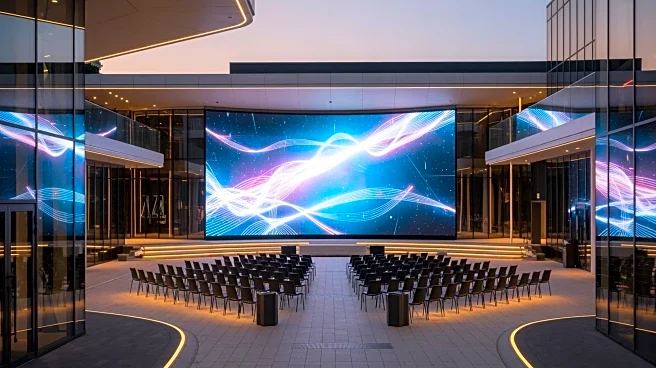What's Happening?
The 12th edition of Expocine, Latin America's largest movie theater trade show, is taking place in São Paulo from September 30 to October 3. This event showcases the growing international visibility and domestic box office success of Brazilian films. Notably, the film 'I'm Still Here' won an International Feature Film Academy Award, marking a significant achievement for Brazil. The National Cinema Agency reported that Brazilian films captured a 10.1% market share of the country's total ticket sales in 2024, a substantial increase from previous years. The event will feature discussions on leveraging this international visibility to foster sustainable development in Brazil's film and TV industry.
Why It's Important?
The success of Brazilian films on the international stage signifies a shift in the global film industry, highlighting Brazil as a burgeoning hub for high-quality cinematic productions. This growth not only boosts Brazil's cultural influence worldwide but also strengthens its domestic film industry, potentially leading to increased investment and job creation. The rising market share of Brazilian films indicates a growing appetite for local content, which could drive further innovation and diversity in storytelling. This development is crucial for Brazil's economy, as it opens up new avenues for cultural exports and enhances the country's soft power.
What's Next?
Expocine will host panels and workshops to explore strategies for sustaining the momentum of Brazilian films. Discussions will focus on co-productions, distribution, and exhibition within Latin America, as well as addressing challenges like film piracy and VOD regulation. The event aims to provide insights into the future of Brazil's film industry, including the role of big data and the impact of Generation Z consumer habits. The case study of 'The Secret Agent' will offer detailed insights into production and distribution strategies, potentially guiding future projects.
Beyond the Headlines
The rise of Brazilian cinema reflects broader cultural and political dynamics within the country. Films like 'Apocalypse in the Tropics' explore the intersection of religion and politics, offering a unique perspective on Brazil's societal issues. This cinematic trend not only entertains but also educates global audiences about Brazil's complexities, enhancing cultural understanding and dialogue. The emphasis on storytelling rooted in Brazil's rich and sometimes absurd realities underscores the country's potential to influence global narratives through film.










